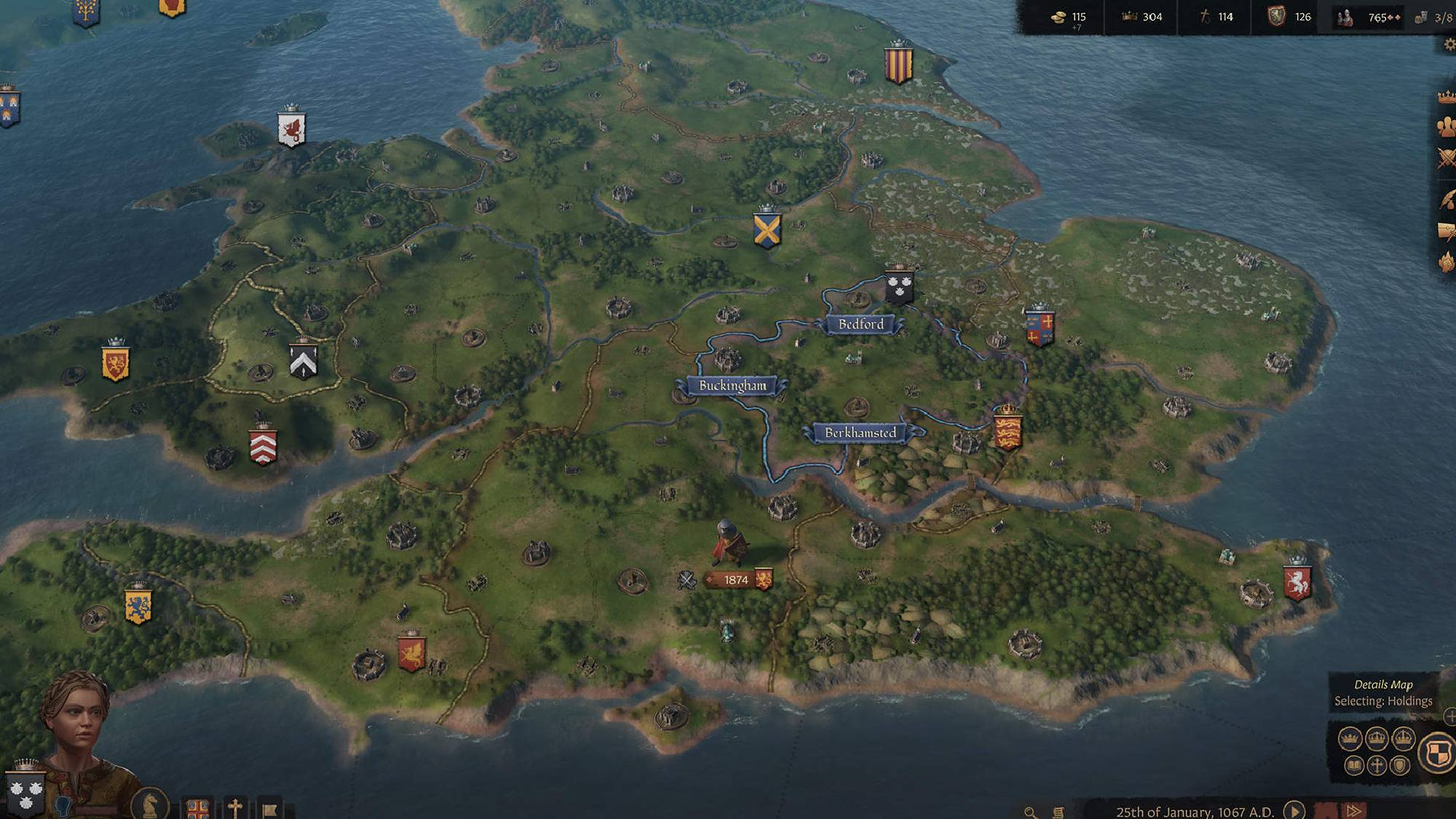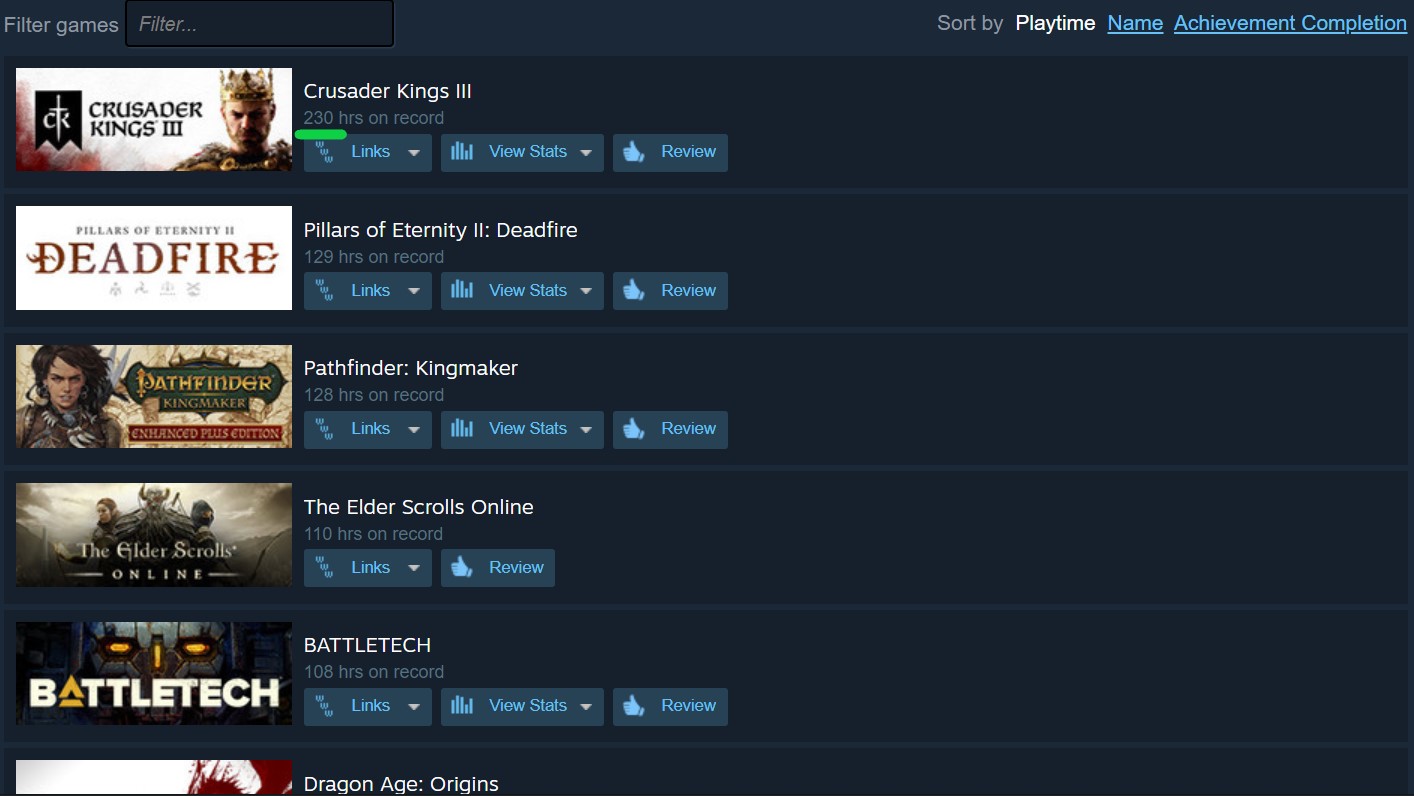Crusader Kings 3 seemed impenetrable — but now it’s my most-played Steam game
Crusader Kings 3 is the best grand strategy game you're (probably) not playing
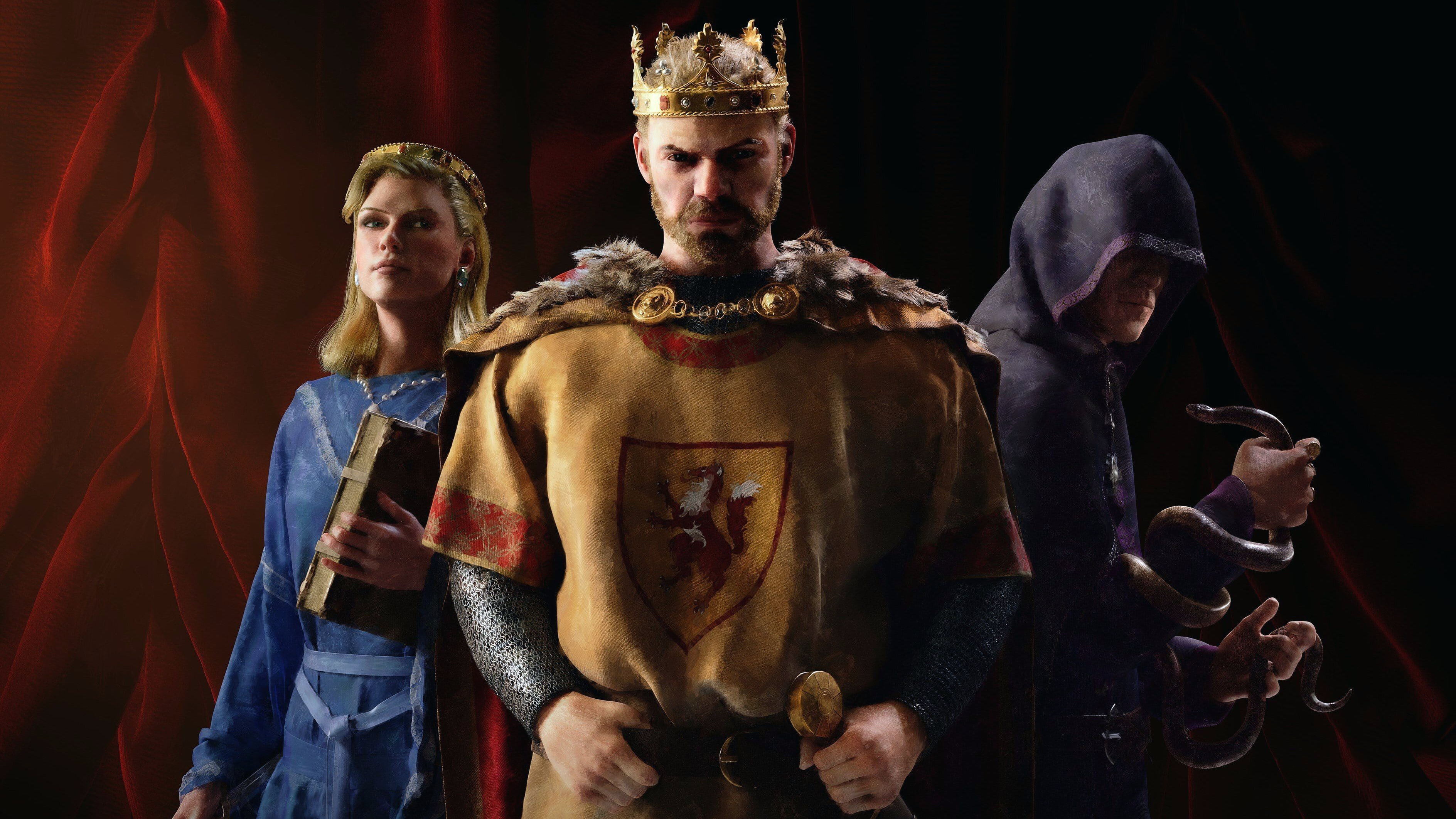
Welcome! This column is part of a regular series in which we share what members of the Tom's Guide staff are playing and enjoying right now, with an eye towards helping you find great games that you may have missed. Don't miss our recent column on why you should play Marvel Ultimate Alliance 3 for the Nintendo Switch.
Crusader Kings III is a daunting game for first-timers. Released on PC in 2020, this grand strategy game from Paradox Interactive presents you with a map of medieval Europe and a challenge: pick a realm and guide its ruling dynasty to glory.
In practice, that means spending hours scrolling around the map and navigating menus to do things such as bribe other rulers, arrange marriages, launch schemes against rivals (or allies) and conduct war. It’s the latest in a line of Crusader Kings games, which have always seemed far too complex for a bumbling grand strategy novice like me. Until recently I’d happily resigned myself to never understanding what makes Crusader Kings fans so passionate about these games.
Then the COVID-19 pandemic happened, and I abruptly found myself with a lot more free time on my hands. Unfortunately, I developed severe carpal tunnel in both of them around the same time, meaning I couldn’t put my suddenly idle hands to work grinding out more rewards in Forza Horizon 4 or Apex Legends. For a time I resigned myself to giving up games entirely, but after a few months I couldn’t resist the itch. I had to play something engrossing, and it had to be something I could play for sustained periods without typing or holding a gamepad.
Enter Crusader Kings III. Suddenly, the previously daunting prospect of having to play a game primarily via clicking on a map and a series of menus became liberating. You can play CK3 with just the touchpad on your laptop, and you can pause, slow down, or speed up the game at will, which makes it great for someone like me who can’t reliably spend more than 15-20 minutes typing or holding a controller without serious discomfort.
That was all the incentive I needed to give Crusader Kings 3 a second chance in 2020. Now it’s 2022, and Steam tells me I’ve spent over 200 hours playing this game. For some CK fans that’s a drop in the bucket, but for me it’s the most time I’ve spent in any game by a wide margin. I don’t know if I’d say it’s my favorite game ever made, but it’s certainly the game I’ve spent the most time playing over the past two years. I’m glad I sat down to give it another shot.
The story of how I went from being terrified of Crusader Kings to playing it more than any other game in my Steam library is straightforward. I hope that by sharing it, I can convince at least a few others to take a similar plunge. Complicated grand strategy games such as CK3 can be deeply off-putting, and even alienating when you boot them up for the first time, so I understand why you might ignore them entirely.
Now that I’ve become a CK3 fan I’m dying to have more friends to talk about it with, so I hope you’ll indulge me as I briefly guide you through what I think makes Crusader Kings 3 so appealing. I'll also offer some advice on how to get to grips with its complicated (but deeply engrossing) gameplay mechanics.
Get instant access to breaking news, the hottest reviews, great deals and helpful tips.
How to quickly get to grips with Crusader Kings 3
What Crusader Kings III is, on its surface, is a $60 PC game (coming to consoles in March 2022) in which you play a dynasty of rulers in the Middle Ages. You start by picking (or creating) a ruler of a region on the map, which spans all of Europe, a good portion of Asia and a bit of Africa. You choose to start in either 867 or 1066, and can play until the game ends in 1453, taking over as your heir every time your ruler dies. It’s possible to lose the game by losing all of your ruling titles, but in over 200 hours of play, I’ve never seen that happen.
You'll spend most of your playing time poring over the (sumptuous) map of the game world, which you can configure to show the relative locations of counties, duchies, kingdoms, empires, religions and ethnic identities. At first this will probably seem daunting, but try not to worry about all the fiddly bits. What matters most in Crusader Kings 3 is how much land you control, and how content the people who live there are with your rule.
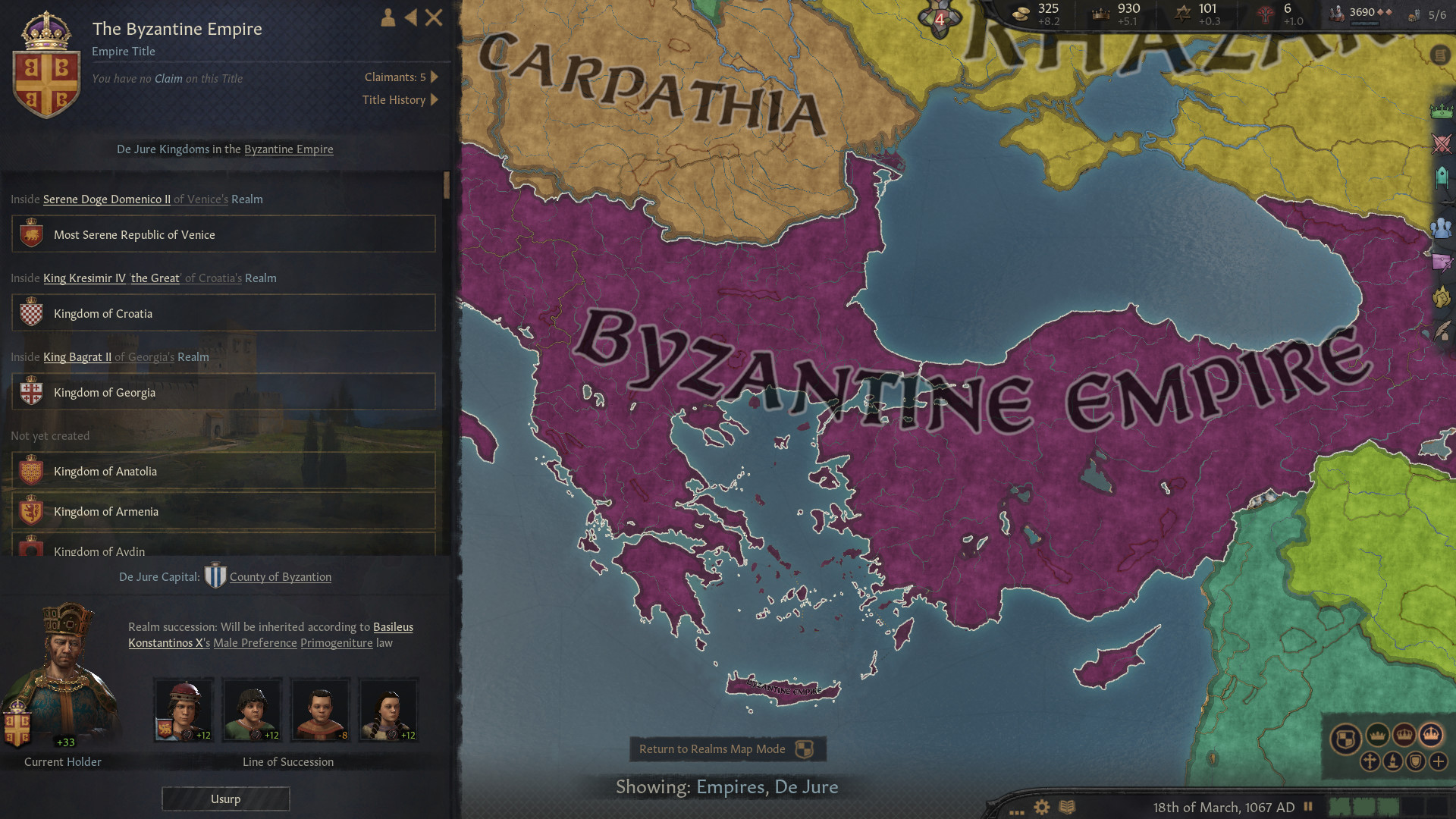
How much land you control directly influences how much money you earn and how big of an army you can raise. These are two of the most important currencies in Crusader Kings 3.
The way money works is pretty simple: you can see how much you're bringing in and sending out at a glance by letting your mouse hover over the gold icon in the top-right corner of the screen. Don't spend more than you make, and if you start losing money (which most often happens when you're at war), try to cut costs before you run out. Your treasury can carry a negative balance in CK3, but being in debt causes a lot of problems that you're better off avoiding. The fastest way to cut costs is end any wars and stop paying any man-at-arms regiments you may have, and though that may cost you a war or two it's often better (in my experience) to stay solvent and throw a war than try to fight it out to the bitter end and risk winding up defeated and in debt.
Of course, declaring war is one of the most common ways you get your hands on more land. As you spend more time in the game you'll learn there are a few other ways to increase your holdings, some more devious than others, but if you want to grow your realm you'll often find yourself mulling over which nearby realm would look better with your banner on it.
CK3 uses a simplified hierarchical system for describing how land works. The smallest unit of region measurement you need to worry about are counties. Counties are collected into duchies, duchies are collected into kingdoms and kingdoms are collected into empires. As you grow your holdings you'll ascend in rank and even gain vassals, other rulers of smaller realms that pledge loyalty to you and give you a percentage of their gold and troops.
But there's one big stumbling block here that the game doesn't do enough to warn you about: vassals prefer to swear fealty to their De Jure liege, which means the person entitled to rule the realm they belong to. So if the count of Dublin is one of your vassals, he'll be unhappy if you don't also own the title to the duchy of Meath which Dublin is a part of. The game will warn you if you're not the De Jure liege of some of your vassals, and I highly recommend you make arrangements to transfer such folks to their rightful lieges ASAP. While it may feel weird to voluntarily give up vassals (and the money and troops they give you), I've found that playing within the rules on this point helps avert a lot of headaches and rebellions as you build your empire.
But while building your empire and climbing the ranks from Count to Duke to King to Emperor is a big part of CK3’s appeal, but it’s hardly the most exciting part.
How to enjoy Crusader Kings 3 as a story generator
Instead, what I learned diving deep into CK3 is that it’s a magnificent machine for generating interesting stories. As you guide your dynasty of rulers through their lives you spend a great deal of time interacting with other characters in the game at all ranks of society, from lowborn to empress, all of whom are simultaneously operating independently in the world doing their own thing. That means you constantly need to be on guard against other characters scheming against you. This gives the game a real sense of tension and mystery. But more importantly, it means you get to watch all these AI-controlled people plotting against each other, and the results are often compelling and hilarious.
That’s because Crusader Kings 3 is peppered with writing and in-game events that make it feel much more dynamic and alive than it looks. As you make decisions and watch time progress, you’ll regularly encounter these events, which pop up and describe a scene your ruler encounters using flavor text, then ask you to make a choice.
These in-game events are remarkably well-written and sometimes genuinely funny. That's important because if you play long enough you’ll encounter countless variations of some of them. These events breathe life into the little 3D character models that represent people in Crusader Kings 3. They effectively punctuate the decisions of the game’s AI-controlled cast, turning the whole game into an incredible storytelling engine that spits out triumphs, tragedies and hilarious tribulations all tailored to you and your decisions.
Here’s an example: Not long ago I was playing a game as an Irish count trying to unite the island against invaders. Things were going well: I had a highly-skilled spouse helping me run the realm, and I had two healthy sons in line to inherit my title. They both came of age without running into trouble (an uncommon occurrence for heirs in this game), so to avoid splitting the realm between them I asked the older, less impressive son to join a holy order and thus remove himself from the line of succession.
It worked and everything was going swimmingly, until suddenly my spymaster informed me that he’d uncovered a plot to murder my youngest son. However, the perpetrator remained a mystery. With my ruler getting up there in years I was out of time to churn out a new heir, and I’d already sent the other one packing into the priesthood. This was a serious threat.
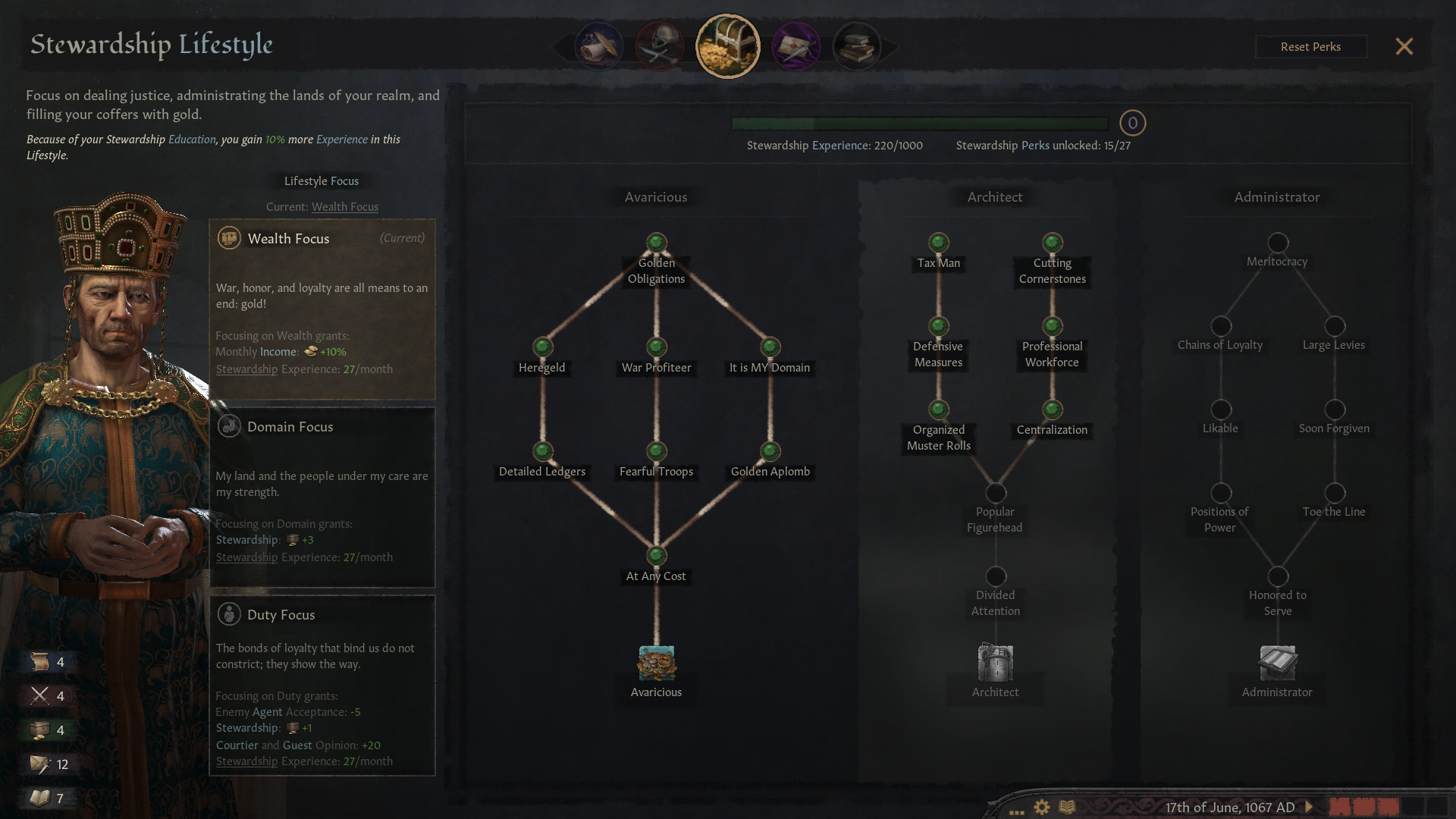
To deal with the situation, I tasked the spymaster with ferreting out schemes in my court and started carefully analyzing all of my potential rivals, showering the most threatening in gold and favors in an effort to try and stave off an attack. Finally, I had my ruler switch to an Intrigue lifestyle (lifestyles are like perk trees – over time your ruler unlocks upgrades and abilities tied to whatever lifestyle they’re currently studying), and roped in my spouse to boost my Intrigue. I thought that this process would leave me best-prepared to disrupt and defend against whatever scurrilous dog plotted to murder my son.
Not long after, my ruler threw a feast to try to drum up some popular support among his courtiers. Everything was proceeding as planned when suddenly, an event popped up describing how my ruler stumbled outside to relieve himself, only to find his youngest son being stabbed to death by his eldest.
This was basically my worst nightmare, and I thought for sure the game was over. However, I saw a path forward – if I didn’t tell anyone that I’d witnessed a murder, the secret wouldn't get out, and I could still perhaps find a way to get my only living son out of his priest robes and back onto my throne after I was gone.
The whole thing made me feel queasy, but it seemed like the only way to ensure the continuity of my dynasty. So, I looked the other way, bonded with my eldest son over his sudden passion for kinslaying, and got to work sorting out how I was going to get him back into the line of succession.
However, the feast was still going on despite the recent murder out back, and right before it wrapped a final event triggered that saw me bear witness to two bodies tumbling out of a cabinet in the midst of a passionate embrace: those of my eldest son and my wife.
My wife!
I don’t know what confluence of factors and features interacted to cause these events to occur this way. But the result is that now I have this fantastic over-the-top tale to tell about how I sent my no-good eldest son to a monastery, only to have him sneak back to murder his brother and sleep with his mother. And in the end, I was happy to cover up his kinslaying and give him my throne!
That son went on to be an accomplished ruler who defended the realm against the threat of English invasion while improving local infrastructure and, incidentally, getting really into witchcraft.
Stories like these are what have kept me playing Crusader Kings 3 for upwards of 200 hours. Once you encounter a few of your own, I think there’s a good chance you’ll be hooked too. Just give the game enough time to learn the basics, get to grips with how you can interact with other characters, and set yourself a goal – like, say, uniting Ireland.
That was all I needed to discover that this is probably my favorite strategy game of the past decade (sorry, X-COM 2), and I hope you’ll find it equally rewarding. Just make sure to always leave enough gold in the treasury for your heir to throw a few parties, and never trust an eldest son with a grudge.

Alex Wawro is a lifelong tech and games enthusiast with more than a decade of experience covering both for outlets like Game Developer, Black Hat, and PC World magazine. A lifelong PC builder, he currently serves as a senior editor at Tom's Guide covering all things computing, from laptops and desktops to keyboards and mice.
 Club Benefits
Club Benefits





